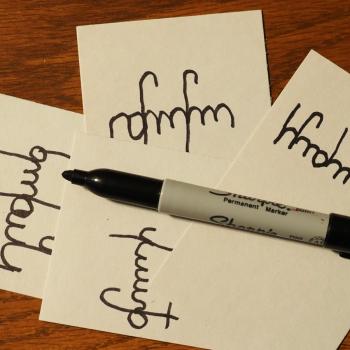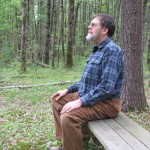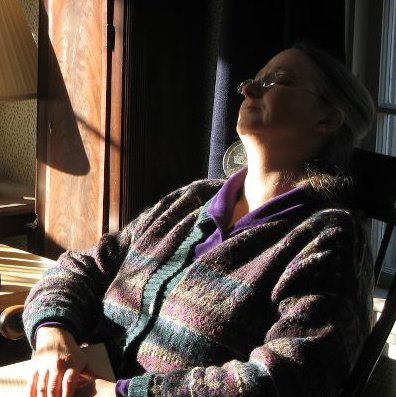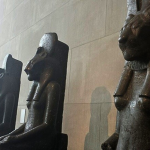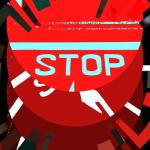One of the dangers of being Quaker–or Pagan–is a privilege at the same time.
Quakers and Pagans share a somewhat counter-cultural view of our society. In slightly different ways, most Quakers and most Pagans believe that human society is flawed in bitterly destructive ways that must be confronted and changed. We look out at a world burdened by the selfish exploitation of whole nations of human beings, and of the ecosystem itself, and we know that things as they are are not OK.
| David Shankbone 2011 |
The privilege and the danger that arises from this is that of associating with activists.
It’s a privilege, of course, to have a chance to be inspired by those who are willing to risk imprisonment or even death to be faithful to their spiritual convictions. This inspirational force is excellent for warding off complacency and the kind of internal self-congratulation that degrades possessing a moral compass into mere spiritual materialism and self-worship.
When I have done some small thing outside the norm for our consumer society, friends outside my spiritual communities are likely to comment on it, if they know. “Oh, you’re so good,” they say. “You’re so kind.”
What they mean is, I’m a moral freak. I act in accordance with my compassionate urges; I trust my spiritual leadings enough to do… anything, anything even moderately inconvenient to myself.
What they mean is, “You do it, Cat. I’m not going to–because I’m not ‘good’ like you are. I’m not a saint.”
And I get impatient with that. I get impatient with it firstly because by praising simple acts of ordinary faithfulness, my secular friends are tempting me to think too much of my own “goodness” (which is, paradoxically, fatally destructive to actually noticing those small promptings toward doing right that got me to act in the first place).
And secondly, I get impatient with it for much the same reason my activist friends probably get impatient with me: because I hear the “opt out” in their praise, and I dislike it.
I admire deeply the principled activism of men and women like Tim DeChristopher, Sister Megan Rice, and Jay O’Hara. I recognize the sacred nature of their work. I hold them in the Light. I hold them up as models to myself. I sign petitions, circulate stories, and make donations where that’s possible. But I am not following in their footsteps.
I am not the one blocking an illegal BLM oil and gas rights auction; I am not the one breaking into a nuclear facility; I am not the one obstructing the delivery of coal to a highly polluting coal plant. I’m not participating in Occupy Our Homes or Moral Mondays.
From the perspective of many of my friends who are activists, I’m sitting on the sidelines, cheering when I should be joining the team. Some of them tell me so outright. They want me with them, on the barricades along with every other warm body they can muster, because the world is in desperate danger right now, and I’m doing my laundry and posting pictures of my garden on Facebook.
So I get challenged by my activist friends. This is difficult, but useful. I should be challenged. I should be uncomfortable. I should be bothered by the prophetic voices around me. That, after all, is what prophets are for. That’s not the danger.
The danger is in listening too hard to their voices, lending too much recognition to their faithful work, and not staying grounded in my own.
If I join in their work, who will do mine?
I don’t just mean, who will do my job and pay my mortgage–though I’d be lying if I said I didn’t care about that.
But I also know, in a deep place that I sometimes forget to listen to if I allow myself to feel too overshadowed by my prophetic friends, that there is work that is being asked of me, and I’m doing it.
My work is small. You will not see my photograph in the papers for it. And it’s implausible as hell I’ll ever face jail or serious persecution over it, too. What is my work?
I’m the one who teaches high school English in a small town in Massachusetts. I’m the one who calls students on it every time they make a homophobic comment in my hearing. I’m the one who teaches my freshmen what the Bechdel Test and Spike Lee’s Magical Negro critique are when we watch movies in class. I’m the one who hangs in there with a kid with a miserable attitude, until the day they do something right in class, and I can let my face light up like a lamp. I’m the one who is trying to live in a consistent, every-minute-Zen sort of way, showing respect and compassion for every pain in the ass student, canvasser, dog-walker, or store clerk in my day, and when I fail, I do fail trying, and then I try again.
And I’m the one doing very ordinary acts of very ordinary faithfulness. Recycling. Writing my Congressmen. Holding a friend while she cries. Cooking supper.
Does that even matter, in a world where climate change is made only more inevitable by the increasing inequalities that corrupt our political system? Does that even matter, in a world where species are dying off at a rate unparalleled since the extinction of the dinosaurs?
Yeah. Weirdly enough, it does.
I even know it does, when I dare to hear the small voice of truth inside of me.
I don’t know if it’s because my work–the ordinary human faithfulness of an ordinary human being–is eventually going to open hearts and minds in ways that may turn things around. I don’t know if it’s simply that somebody has got to hold the Center, some sort of place of connection and respect and compassion in the world.
I just know that it’s my work, put into my hands, and I need to do it right.
For now. If my work changes–if I’m supposed to drop everything and go chain myself to the White House fence–I freely admit I’m going to be very resistant to that. I like my life. I like my work. I like the sense of purpose I have right now, in my own small way.
I can’t be sure I’d even have the strength to pray to be faithful to those leadings, if they came.
| David Shankbone 2011 |
But the key word is if. For now, I’m right where I’m supposed to be: teaching school. Doing my laundry. Writing my blog.
I will try to be awake if a different call comes through.





